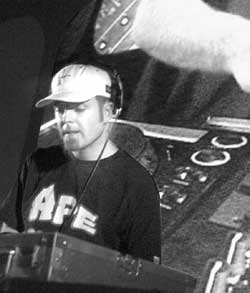![]()
![]()
![]()
![]()
 |
|
DJ Shadow isn't dead. He's free.
|
 n 1996, Josh Davis, a white kid from suburban California, dropped an album that redefined hip hop music. Titled Endtroducing, the mostly instrumental LP expanded the scope of the DJ’s arsenal to previously unimagined proportions. In addition to the ’70s soul, funk and jazz records DJs rely on to create new grooves, Davis pillaged sci-fi soundtracks, prog rock, new age, classical and anything else that inspired him. Leaving no slab of vinyl unturned, Davis unearthed an entirely new species of hip hop.
n 1996, Josh Davis, a white kid from suburban California, dropped an album that redefined hip hop music. Titled Endtroducing, the mostly instrumental LP expanded the scope of the DJ’s arsenal to previously unimagined proportions. In addition to the ’70s soul, funk and jazz records DJs rely on to create new grooves, Davis pillaged sci-fi soundtracks, prog rock, new age, classical and anything else that inspired him. Leaving no slab of vinyl unturned, Davis unearthed an entirely new species of hip hop.
Endtroducing’s sound wasn’t its only visionary turn. For his on-wax alter-ego, Davis selected the moniker DJ Shadow. At a time when rap music was dominated by pimps, gangsters and overblown egos, Shadow shifted the emphasis back to the music. Without an MC, and only the hisses and pops of dusty records to mold his message, Shadow bared his soul with an honesty unique among his peers.
After an interminable wait (and a few side projects), Shadow returns with The Private Press, a difficult album of technically ambitious tunes that rewards repeated listening. His most reticent work to date, Private Press invites speculation where it avoids explication. Obviously, the specter of Endtroducing loomed large over the Private Press sessions, and the resulting album chronicles Shadow’s attempts to evade, confront and destroy his past.
“Fixed Income” introduces the album proper, juxtaposing a tense, off-time bass line with shards of tremoloed surf guitar and delicate harmonics. The sound is vintage Shadow, soulful and hypnotic. It’s the funk that’s missing, replaced with a dissonance that hints at something sinister lurking beneath the surface.
Following a brief flurry of sardonic vocal samples, “Walkie Talkie” attempts to ease the tension with a dash of humor. As an emphatic voice asserts, “I’m a bad muthafuckin’ DJ,” Shadow frantically slices and dices on the wheels of steel. There is a parallel between the placement of these first songs and the start of Endtroducing, which placed the somber opener “Building Steam” next to the DJ-as-superhero party tune “The Number Song.” It’s as if Davis is trying to recreate Endtroducing’s formula, but the recipe is incomplete.
“Six Days” and the two-part “Mongrel … Meets His Maker” are stunning updates of the sound Davis developed as part of the production team U.N.K.L.E. “Mongrel” is Shadow at his haunting best. As a repeated guitar figure and complementary synth line create a foreboding atmosphere, spacey swells and ghostly cries float through the mix like ghosts in the machine. But even this piece suffers from sonic claustrophobia.
It’s as if Shadow doesn’t trust the material enough to let it breathe—sputtering machinery, ringing phones and white noise are ever present, emulating the somnolent hum of an opiate high. It’s a shame because the song’s starkest moment is also its most powerful: the raw ache of a solitary piano, weaving its melancholy melody across the hissing vinyl.
 f the previous songs revisit Shadow’s past, “Right Thing/GDMFSOB” offers a possibility for his future: dancefloor technician. Over drum machine patterns, the track morphs into a high-powered dose of acid-techno, replete with squelches, square-wave synths and sweaty rhythms.
f the previous songs revisit Shadow’s past, “Right Thing/GDMFSOB” offers a possibility for his future: dancefloor technician. Over drum machine patterns, the track morphs into a high-powered dose of acid-techno, replete with squelches, square-wave synths and sweaty rhythms.
The technical tour de force “Monosylabic” suggests a more radical direction. Using a single five-second loop, Shadow extracts minute pieces of sonic information and arranges them on a micro-level to create a seven-minute odyssey for aficionados of so-called intelligent dance music. Lovers of Shadow’s organic approach to electronic music will surely shudder to imagine an entire album like this of labored laptop workouts.
Having proved himself capable of new sounds, Shadow spends the duration of Private Press resolving the tension such radical changes create. “Blood on the Motorway” begins with a funeral dirge, signifying that the old Shadow has finally been laid to rest. The highlight of the album, “Blood,” is somber and celebratory at once; synthesizers and chimes evoke the ascension of the spirit, and for the first time, the music ensconces the listener in warmth and beauty as well as sadness.
Is DJ Shadow dead? Far from it. Despite its flaws, The Private Press has liberated him. “You Can’t Go Home Again,” the album’s closer, sums it up best when it offers, “Here’s a story about being free.” With its new wave bass line, Simon & Garfunkel guitar and driving drums, “Home” evokes an open road—a future of unlimited possibility. The icy impenetrability of earlier tracks melts away, revealing joy and optimism beneath. Somewhere in the shadows, Josh Davis is smiling. ![]()
Return to top of the page.